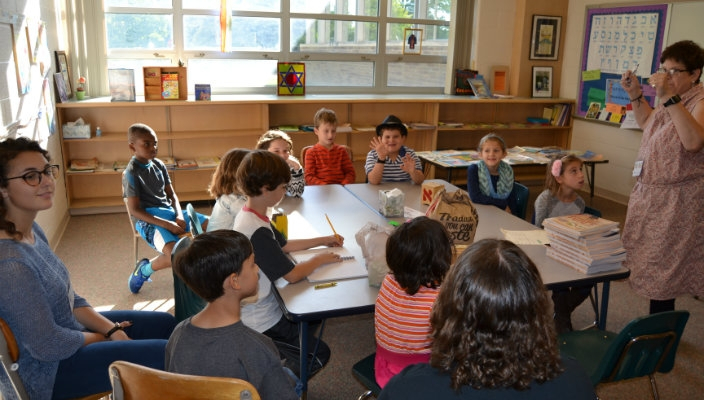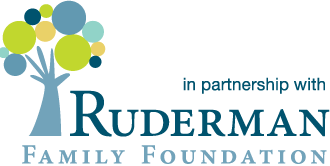How to Say “Yes, and” to Inclusion
02/17/2016
I live in the Jewish education world, while my sister comes from the improv world. Yet, even with my formal training as an educator, it is my sister who taught me the greatest lesson about inclusion of those with special needs in the classroom and the congregational community. She taught me the rule of “Yes, and…” In an improv scene, you should agree to the information your partner gives you, and then add something to it. If, for example, your partner tells you he loves your dress and asks if it is new, you say, “Yes, and I made it from curtains, like Maria in The Sound of Music.”
How does this translate to the world of Jewish education? Judaism believes that every human being is created in God’s image and therefore has unique gifts to share. Yes, and our goal as Jewish professionals is to create a kehilah kedosha, a sacred community, where everyone feels welcomed and valued. Yes, and if we are going to “walk the walk” – to really act out our value system rather than just give it lip service – we must truly create a seat in the classroom for everyone.
Yes, this all sounds wonderful, and how do I make it a reality? It is a question I could not have answered twelve years ago when I first became an educator. Today, though, because I had a deep passion for this work and great mentors and partners along the way, I do have some advice I can pass along:
- First, it is essential to ensure that the leadership team at your institution is in agreement that inclusion of those with special needs is a priority for your community. There are times when this work will be challenging, and it will be important to have support.
- If you do not have a background in Special Needs Education, as most of us do not, find good resources in your community. Find a member in your congregation who works with those with special needs that can serve as mentor, giving you background information, helping you interpret the reports parents might give you, offering trainings to your teachers. Look for resource organizations in your community. Where I live, for example, I turn to Milestone Autism Resources, an organization which focuses on educating and coaching for family members and professionals. Additionally, the Disabilities Inclusion Learning Center, an online portal from the URJ in partnership with the Ruderman Family Foundation, can point you to mentor congregations in your area. Finally, with individual students, you can often talk with those who work with them in their secular school to learn about successful approaches.
- When a parents come to you and asks if you can educate their child with special needs, answer, “Yes, and tell me as much as you can about your child so we can do our best to make this a success for him/her.” Yes, and is the only response that allows the conversation to continue.
- Once you have as much information as possible, make sure your teacher and teen aides know how best to work with this particular student. I rarely give diagnosis information to teachers because every child is different, and I want them to get to know the student, not the diagnosis. Instead, we talk about behaviors, actions, and plans that will work.
- Finally, it is crucial to keep the lines of communication open between all those involved, and to have frequent check-ins. Know that it is not always going to be perfect, and changes will need to be made along the way.
In improv, when you follow the rule of “Yes, and…” hilarity ensues, and you often find tears rolling down your cheeks from laughter. In Jewish education when you follow the rule of “Yes, and…” you will also find tears rolling down your cheeks – tears of joy and success, the tears I found myself shedding when I read the following email from one of our members:
As a parent to both a child who is typically developing and one with rather intense special needs, I see inclusion as an opportunity not just for my daughter with special needs but for the entire community. My daughter with special needs, Caroline, is a joy to be around until she isn’t. At times, her energy level and random screaming make it difficult for our family to participate in activities, like practicing religion. When we found Suburban Temple – Kol Ami, our family found a place where we could learn and grow spirituality, and where we could provide an opportunity for other members of the temple to practice acceptance and inclusion on a regular basis. Our family is accepted and not judged.
When Caroline gets agitated or excited during temple, instead of asking us to leave, we are offered toys to help occupy her so that we can continue to enjoy the service. To me, at the end of the day, I want both of my daughters to believe in themselves, be thankful for the gifts in their lives, and to help others whenever possible – joining Suburban Temple – Kol Ami reinforces those beliefs through weekly lessons and activities, but also by the way our family is treated by other members – with respect, kindness and an embracing spirit.
February is Jewish Disability Awareness and Inclusion Month, a unified initiative to raise disability awareness and support efforts to foster inclusion in Jewish communities worldwide. For important resources created by top disability experts, visit the Disabilities Inclusion Learning Center, created by the Union for Reform Judaism in partnership with the Ruderman Family Foundation.

